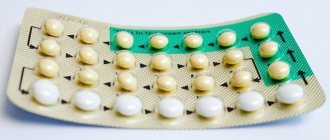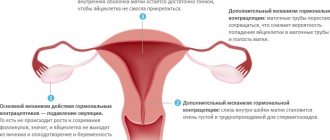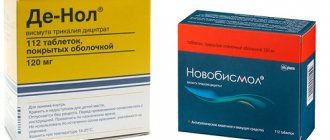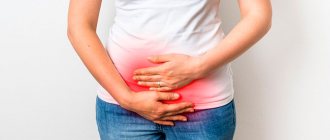- New generation contraceptives for women over 40 years of age: varieties
- Contraceptives after 40 years for women: names of drugs
- Contraceptive drugs for various diseases
For women over 40 years of age, any type of contraception is suitable. But due to the many risks, it is better to give preference to those that do not have a negative effect on the body. When choosing contraceptives for women over 40 years of age, one should take into account reliability in protection against pregnancy, the possibility of preventing various gynecological diseases and therapeutic effects.
Rules for taking the mini-pill
Before starting to take the mini-pill, a woman should consult a doctor and make sure that she is not pregnant.
ChPK must be taken daily, one tablet at the same time. The drugs have the most powerful effect 4-5 hours after administration, so it is best to take the tablets in the evening, from 18 to 20 hours. The instructions for a specific medicine indicate the maximum time for which you can delay taking it without consequences: for most mini-pills - for 3 hours. For some drugs containing desogestrel, this period is 12 hours. If a woman completely forgets to take POC, she should not take two tablets the next day. Regardless of how many days are missed, the regimen remains the same: one tablet per day (and no more). But in such a situation, you need to use additional contraception until the onset of menstruation. If you miss your period due to taking the mini-pill, you must use condoms for 14 days. If a woman had unprotected sexual intercourse within 5 days before the pass, it is recommended to use emergency contraception.
Chances of getting pregnant while taking the mini-pill:
- for those who regularly take pills – 0.3% (3 cases per year per 1000 women);
- for those who periodically forget to take POC – up to 9% (9 cases per year per 100 women).
Starting to take ChPK in various situations:
- You can start taking mini-pills on any day of the menstrual cycle. If you start taking it from the 1st to the 5th day of the cycle, no additional measures need to be taken. In other cases, it is necessary to abstain from sexual intercourse or use barrier contraception for 2–14 days (the period is indicated in the instructions for the drug);
- Even if a woman is breastfeeding and her period has not yet begun after giving birth, ovulation can still occur. Therefore, taking the mini-pill starts from the 3-4th week after birth (and if necessary, even earlier). If you haven’t had your period yet, and the baby is completely breastfed, then additional contraception will not be needed. If there is no menstruation, but complementary feeding makes up more than 15% of the baby’s nutrition or the mother does not breastfeed at all, then it is necessary to use barrier contraception or abstain from sexual intercourse for 2–14 days after starting to take the drug;
- It is best to start taking the mini-pill the day after an abortion or pregnancy loss. If more than a week has passed since the abortion or miscarriage, in the first 2–14 days after starting to take the contraceptive you will have to use barrier contraception or refuse sexual intercourse;
- when switching from COCs to PCPs, the first mini-pill tablet is taken the very next day after finishing taking the COC. Usually this day coincides with the beginning of the menstrual cycle. If the transition to PCP occurs after the 5th day of the cycle, then additional contraception must be used for at least 2 days;
- If a woman experiences vomiting or diarrhea in the first 4–5 hours after taking the mini-pill, she must abstain from sexual intercourse or use barrier contraceptives until there is no vomiting or diarrhea within 48 hours after taking the pill.
If a woman has to take emergency contraception:
- in the case when the drug contains levonorgestrel, taking the mini-pill is resumed the next day, and condoms are used for 2-14 days;
- if the drug contains ulipristal acetate, then the first tablet of ChPK is drunk only after 5 days, but condoms are used for 2 weeks.
How to take hormonal pills after 30?
The main task of contraceptives for women is to protect the egg from penetration, the danger of which occurs only once per cycle. For men, the situation is more complicated: the product must be able to stop the flow of millions of sperm. Most representatives of the stronger sex who have a permanent partner use the method of interrupting sexual intercourse.
After 30 years, monophasic type contraceptive pills are selected for those who have given birth and those who have not given birth. They contain a small dose of the hormone, which is sufficient to suppress ovulation and protect against pregnancy. A combination of ethinyl estradiol and one type of gestagen is used. Progestins have a contraceptive effect, and synthetic estrogens are necessary to maintain pituitary function. Preference is given to the following types of gestagens in birth control pills:
- levonorgestrel;
- gestaden;
- desogestrel;
- norgestimate.
These substances have virtually no androgenic activity, so when taking medications, acne, oily skin and hair, and hirsutism will not appear. A woman will also not gain weight with correctly selected contraceptives. These components are included in the following drugs:
- Gestarella;
- Regulon;
- Lindinet;
- Silest.
Women with signs of hyperandrogenism need contraceptives, which reduce the activity of male hormones. This task is accomplished by:
- Yarina;
- Jess;
- Janine;
- Dimia;
- Silhouette;
- Midiana.
Thanks to drospirenone or dienogest, they suppress the activity of androgens, the skin gradually clears of acne and looks better.
After 30 years, it is necessary to take OCs strictly on time; changes in the time of administration by more than an hour are not advisable. The tablets are taken from the first day of the menstrual cycle, one per day for 21 days, after which a break of 7 days is required. You cannot increase the break time; the contraceptive effect will completely disappear.
After the break, start a new package with the first tablet. If the package contains 28 tablets, there is no need to take a break. Do not skip pills or take more than 1 per day. But in cases where the tablet is forgotten for less than 24 hours, following the diagram in the instructions, you can take it.
Which contraceptives to choose after 40 years
The pharmaceutical market is replenished every day with new names and manufacturers of contraceptives. Let's consider drugs that are suitable for adult women.
Mini-pill
Gynecologists advise older women to give preference to contraceptives that contain a minimal amount of estrogen - mini-pills. Today they are considered the safest and most effective.
- Charosetta;
- Lactinet;
- Microlute;
- Exoluton;
- Micronor.
COOK
There is another effective type of medication that inhibits ovulation and reliably protects against unwanted pregnancy - combined oral contraceptives. Compared to the mini-pill, these birth control pills after 40 years of age have a wider range of side effects, but in the absence of contraindications, doctors recommend that women take some of the drugs in this group:
| Drug name | Characteristics and price | Photo |
| Triziston | Thanks to the active substance of the drug, viscous mucus is formed, which prevents fertilization. The cost of the drug is from 490 to 560 rubles, depending on the region. | |
| Triquilar | The drug is available in tablets. It increases the production of sex hormones, as a result of which ovulation becomes impossible. Price from 380 to 460 rubles. | |
| Marvelon | Modern hormonal pills. In addition to 99% protection against unwanted pregnancy. This drug with an androgenic effect improves skin condition and helps get rid of acne. Price from 1400 to 1500 rubles. | |
| Jess | Popular new generation contraceptives. In addition to the contraceptive effect, it has medicinal properties. Effective in the treatment of cysts and fibroids. Cost from 950 to 1400 rubles. | |
| Silest | It slows down the process of egg maturation and makes fertilization impossible. The average price is 400 rubles. | |
| Janine | It is a single-phase contraceptive, most relevant for nulliparous women. The active substance affects the uterine mucosa, inhibiting sperm. Cost from 890 to 940 rubles. | |
| Regulon | Effective in treating cysts, normalizes the menstrual cycle, and prevents egg fertilization. Price from 340 to 480 rubles. |
Emergency contraception
In addition to pills that must be taken daily, there are so-called “SOS contraceptives”. In this case, the package contains only one tablet, which must be taken after the act of intimacy.
Doctors do not recommend using them for women over 40 years of age due to the high risk of bleeding or other problems.
Please note that the names of medications are indicated for informational purposes only and are not a guide to self-prescribing the drug without consulting a doctor.
What is better to use after 40 years, the IUD or birth control pills?
Doctors believe that at this age it is better to give preference to hormonal pills. As a rule, women after forty experience a lack of hormones, which is necessary to maintain youth and maintain an active sex life.
Also, the advantage of hormonal pills compared to the IUD is the minimal number of side effects, which occur very rarely.
Women's health after 30 years
For women over 30 years of age, the onset of menopause is still a long time away, and severe endocrine disorders and hyperplastic processes in the reproductive organs appear less frequently than at older ages.
Some have already managed to realize themselves as mothers, but in recent years, city residents have been postponing the birth of their first child until after the age of thirty. By this time, they have time to make a career and become financially successful. But health does not always remain impeccable. For women over 30 years of age, various methods of contraception are used, but one of the main rules is maintaining reproductive health.
It includes not only maintaining normal hormonal levels, but also protecting against sexually transmitted infections. It is they who most often become the cause of chronic inflammatory processes in the pelvis and subsequent tubo-peritoneal infertility, which is difficult to treat.
Review of popular mini-pills - table
| Name | Active substance | Peculiarities | Contraindications | Side effects | Price |
| Charosetta | desogestrel - 75 mcg | It has weak androgenic activity, so it can cause acne. If necessary, it can be combined with drugs containing estradiol. |
|
| From 1359 rub. |
| Microlute | levonorgestrel - 30 mcg | Can be used as emergency contraception, as well as for therapeutic purposes to correct hormonal disorders. |
|
| From 300 rub. |
| Exluton | linestrenol - 500 mcg | Used to treat endometriosis and in the presence of uterine bleeding. Can be used to delay menstruation and also for contraception. |
|
| From 2839 rub. |
| Continuin | ethynodiol acetate - 500 mcg | Prescribed for contraception in case of thromboembolic complications and during lactation. |
| Lengthening or shortening the menstrual cycle. | From 232 rub. |
| Lactinet | desogestrel - 75 mcg | Used for contraception in the presence of estrogen intolerance. Regular use helps reduce the level of estradiol in the blood. |
|
| From 585 rub. |
| Micronor | norethisterone - 350 mcg | Prescribed for contraception and for progesterone deficiency as replacement therapy. |
|
| From 100 rub. |
| Norkolut | norethisterone - 500 mcg | Used to treat premenstrual syndrome, uterine fibroids and endometriosis. Helps stop lactation and has a therapeutic effect on endometrial hyperplasia. |
|
| From 120 rub. |
Drug selection criteria
Even if you choose the right contraceptive hormonal pills after 30 years, side effects may occur. Some women notice the following symptoms:
- headache;
- digestive disorders;
- decreased libido;
- weight gain or insufficient weight loss on a diet;
- vaginal dryness;
- irritability;
- deterioration of the veins.
Such undesirable effects of contraceptives can be corrected by changing the drug. But in some cases, hormone withdrawal is necessary.
Young girls who have given birth and those who have not given birth can use hormonal drugs; there is no strict age criterion. But a prerequisite is an established menstrual cycle. For girls who have not reached menarche, using OCs is dangerous. For young girls with an unsteady cycle, hormones are prescribed for therapeutic purposes in the following cases:
- dimenorrhea;
- dysfunctional uterine bleeding;
- stopping hyperpolymenorrhea;
- treatment of acne, hirsutism and seborrhea.
Girls who have not become pregnant do not need a high dose of estrogen. Therefore, for nulliparous young girls, birth control pills should contain 20 mcg of ethinyl estradiol. This is a synthetic estrogen that helps maintain menstrual function. A natural hormone, which is presented in the form of estradiol valerate, it is not used in birth control pills for adolescents. It is recommended for women of older reproductive age and when approaching menopause. You can also take pure progestin agents.
List of drugs allowed for nulliparous girls:
- Charosetta;
- Lactinet;
- Jess;
- Dimia;
- Modell Trend.
Most of these birth control pills have an antiandrogenic effect, so they help fight acne, oily skin and hirsutism. They are also used for polycystic ovary syndrome, which often occurs in nulliparous young women.
For those who have given birth and for women over 25 years of age, it is easier to choose birth control pills; they can contain any dose of hormones, and the gynecologist focuses on the tolerability of the drug and signs of side effects. Therapy begins with microdoses containing 20 mcg of ethinyl estradiol. After 2 months from the start of treatment, the condition is assessed. If there are no adverse reactions, they continue to drink them. Replacement of birth control hormonal pills is required in the following conditions:
- amenorrhea;
- poor control of the menstrual cycle;
- scanty periods;
- pain in the calf muscles.
A lack of estrogen leads to a decrease in the flow of menstrual blood, so women are prescribed contraceptives with 30 mcg of the hormone.
The best birth control pills after 40 years
Modern contraceptives for women over 40 years of age are divided into several groups:
- mini-pills – do not contain ethinyl estradiol;
- combined oral contraceptives;
- birth control pills for women who smoke.
The dosage of the best contraceptives for women is selected individually.
List of mini-pill drugs after 40 years
Tablets that do not contain ethinyl estradiol are prescribed to those patients who are not suitable for combined oral contraceptives. These contraceptives differ in their progestin content, they are less effective than COCs, but have fewer side effects. Pharmacies offer popular and proven contraceptives for women. Their names for patients over 40 years of age:
- "Charozetta." The active ingredient is desogestrel, administration begins on the first day of menstruation. Desogestrel suppresses egg maturation; you can take pills for migraines and vascular diseases. The cost is within 1000 rubles.
- "Microlute." The drug contains levonorgestrel, which inhibits ovulation and egg release. In addition to its protective function, it reduces pain and the amount of discharge during menstruation. Estimated price – from 350 rubles.
- "Exluton". The active ingredient is linestrenol. The drug has a high cost - from 3 thousand rubles, but there are few side effects. It is not recommended to combine Exluton with antibiotics.
Tablets with one active ingredient have a positive effect on the female body. They are indicated in cases where estrogen cannot be taken. Some drugs are recommended to be used intermittently.
Combined oral contraceptives after 40 years
This type of pill perfectly protects against unwanted pregnancy and completely slows down ovulation. Mini-pills have more side effects than new generation birth control pills for patients over 40 years of age. The most popular drugs:
- Marvelon. The drug contains a combination of desogestrel and ethinyl estradiol, suppresses ovulation, protects against pregnancy. Affects the condition of the skin, improving it, eliminating acne and acne. There are 21 tablets in a pack, the estimated cost is from 1600 rubles.
- "Trisiston". The combination of ethinyl estradiol and levonorgestrel inhibits ovulation and thickens the uterine mucus, preventing pregnancy. The cost of the drug is 550 rubles.
- "Triquilar." They are low-dose birth control pills and are best suited for women over 40 years of age. The combination of levonorgestrel and ethinyl estradiol will help prevent pregnancy and improve health during perimenopause. The price of the drug is from 600 rubles.
- "Jess." The most common and high-quality contraceptive drug. Contains ethinyl estradiol and drospirenone, the pack contains active and inactive tablets. Cost – from 1100 rubles.
- "Silest". This product combines norgestimate with ethinyl estradiol. During the reception, the maturation of the egg stops; the price starts from 400 rubles.
As you can see, all of the listed drugs contain ethinyl estradiol, a synthetic analogue of estrogen. Correct use and dosage of modern contraceptives after 40 years will help prevent pregnancy and reduce the symptoms of premenopause.
Birth control pills after 40 for women who smoke
Women who are addicted to tobacco are not recommended to use COCs. This is due to the presence of side effects and contraindications, in particular, the risk of blood clots. Therefore, gynecologists prescribe more gentle drugs that do not contain estrogen.
Based on the above, the conclusion suggests itself that smoking patients are recommended to use only mini-pills - they do not contain ethinyl estradiol and perform an excellent contraceptive function.
Features of the selection of contraceptive drugs after 40
After 40 years, oral contraceptives are selected taking into account the woman’s age and the likelihood of early menopause. Sometimes menstruation stops as early as age 45, which corresponds to early menopause. If this happens at 40, this is premature menopause.
Premenopausal
You can protect yourself after 40 years with the help of estrogen-progestin drugs, but the dosage is selected carefully. The condition of the mammary gland is taken into account and an ultrasound is performed. If, based on the results, there is a suspicion of a neoplasm, hormones should not be used. They increase the risk of breast cancer progression.
In case of menstrual irregularities, frequent dysfunctional bleeding, it is necessary to establish their cause. After 40, the incidence of cervical, endometrial and ovarian cancer increases sharply . These diseases may be accompanied by acyclic bleeding, but contraceptives are contraindicated.
It is also necessary to take into account the severity of the symptoms of approaching menopause, which is why birth control pills are often used in premenopause as a component of hormone replacement therapy.
During menopause
Menopause is the period in a woman's life after her last menstruation; it is called menopause and is determined retrospectively. If there are no periods during the year, it is considered that menopause has occurred. The function of the ovaries is completely suppressed, they practically do not produce estrogens, and eggs do not mature in them. Therefore, there is no need for contraception.
How to choose
A specific contraceptive should only be selected by a doctor. It takes into account age, childbearing experience, and regularity of intimate life. One of the selection criteria is the constitutional type of a woman:
- Progesterone. Women with this type are tall and masculine in appearance. They have small mammary glands, oily skin, androgenic manifestations are sometimes observed, and menstruation is scanty and short-lived. The cycle is less than 28 days. Before menstruation, such women experience depression and abdominal pain. Such patients are prescribed antiandrogenic drugs: Jess, Yarina, Zhiane-35, Silhouette, Zhanine.
- Estrogenic. These are short women with well-developed mammary glands, dry skin and hair. They are characterized by long, heavy menstruation. Such patients are better suited for high- or medium-dose COCs: Lindinet, Milvane, Triquilar, Triziston, Rigevidon.
- Balanced. Women of this type combine the characteristics of the previous two. Their appearance is feminine, their height is average, their breasts are small, their skin and hair are in normal condition. Signs of PMS are not typical for them. Menstruation lasts 5 days. Silest, Lindinet-30, Femoden, Triquilar, Rigevidon, Persilon, Novinet, Regulon are suitable for this type of woman.
Birth control without hormones at 30
Contraceptives for women over 30 years of age can be without hormones. This composition is only found in tablets and suppositories for intravaginal use. They contain chemical compounds that reduce sperm motility, immobilize them and make sexual intercourse safe.
Spermicides are non-hormonal suppositories, tablets, creams or gels that are used 10 minutes before sexual intercourse. They dissolve, form a protective film and exert their spermicidal effect. Tablets of this type have a minimum of contraindications, the main one being intolerance.
Instructions for use of the mini-pill
To prevent fears of unwanted pregnancy, you need to adhere to a number of rules when starting to use the mini-pill:
- Choose the most convenient time to take the drug. The likelihood of forgetting to take a pill is reduced.
- The maximum effect occurs after 4-5 hours of taking the tablet. In the case of mini-pills, the time of administration must be constantly monitored: this affects the manifestation of the main effect of the drug. Even a few hours make a big difference.
- Use tablets every day. If the old package of mini-pill is finished, you should immediately start a new one. You cannot take a break between them.
- You can start from any day of the cycle, but it will be more effective to start from the first day of menstruation. In this case, the contraceptive effect will be reliable the very next day after taking the pill.
- After an abortion or miscarriage, you need to take a mini-pill tablet for five days.
- If a woman notices obvious side effects from use, she should consult a gynecologist. Most likely, this drug is not suitable, it is better to choose another one.
- If it happens that a woman for some reason forgets to take the mini-pill on time, she should drink the drug immediately after she remembers. Then the tablets must be taken as usual.
- Mini-pill medications affect the nature of discharge on menstruation days. They may become less abundant while the cycle tends to lengthen. This is the norm for contraceptives; there is no need to change or cancel pills.
Contraceptives for women after 35 years
Women over 35 years of age can use intrauterine devices to prevent pregnancy, but they are often contraindicated due to erosions, uterine fibroids, etc. Hormonal contraceptives can be difficult to choose due to smoking, excess weight, and endocrine diseases.
Gynecologists have identified the best oral contraceptives for women over 35 years of age by group:
• Mini-pills: Microlut, Charozetta. They affect gestagens, which make the uterine secretion more viscous, change the structure of the endometrium (the inner layer of the uterus), preventing the fertilized egg from attaching to it. They are suitable for lactating and postpartum women.
• Microdosed COCs: Zoely, Jess, Lindinet. Prescribed for normal hormonal levels, as well as for nulliparous women. They can be used before menopause and do not affect weight. However, it is better for smokers to avoid them, as there is a risk of thrombosis.
• Low-dose COCs: Silest, Microgynon, Demoulen. This is the optimal contraceptive option for women over 35 years of age who have given birth. These products prevent unwanted pregnancy, help avoid iron deficiency anemia, and alleviate the symptoms of menstrual syndrome, but can cause skin hyperpigmentation.
• High-dose COCs: Triziston, Triqualar, Tri-regol, Ovidon, Non-ovlon. Suitable for women who have given birth and suffer from hormonal imbalance.
Women over 35 years of age can avoid unwanted pregnancy with the help of hormonal products that are implanted under the skin and injected. Depo-Provera is administered intramuscularly once every 3 months. In addition to the contraceptive effect, this drug reduces the likelihood of inflammatory diseases and is used for endometriosis.
Norplant or Norplant-2 capsules are implanted under the skin of the shoulder. The contraceptive effect appears within 24 hours and lasts for 3 to 5 years.
The most radical method of contraception is surgical sterilization. This is an endoscopic operation during which obstruction of the fallopian tubes is created. After the operation, sperm cannot reach the egg, menstruation and sexual desire are preserved.
Birth control pills - brief information and classification
Birth control pills - oral contraceptives (OCs) are widely used all over the world and are considered the most effective in terms of protection against unplanned pregnancy.
These drugs are used by millions of women in civilized countries. Before prescribing pills, the doctor takes into account such aspects as the presence of diseases of the reproductive system, hormonal imbalance in general, as well as the age category of the patient who contacts him. Combined oral contraceptives (COCs)
These products contain synthetic hormones - estrogen and progesterone, which temporarily “turn off” the paired organs responsible for the safety, maturity and release of the follicle - the ovaries. Consequently, the egg involved in conception is not produced, which means that conception will not occur.
| View | Characteristic | Drugs |
| Single-phase | Each tablet contains the same amount of active ingredients, regardless of the phase of the monthly cycle. | “Yarina”, “Mikroginon”, “Janine” |
| Two-phase | The estrogen dose is the same in all cycles, but the concentration of gestagen changes in the first and second periods. | "Femoston", "Binovum" |
| Three-phase | The concentration of two hormones changes three times - depending on the phase of the menstrual cycle. | “Tri-regol”, “Novinet”, “Triziston”. |
“Minimal pills”, or mini-pills Contraceptive pills contain low doses of progestin (300–500 mcg), which is an artificial version of progesterone. The hormone helps change the nature of cervical mucus, significantly thickening it. This becomes a real obstacle to the penetration of the male reproductive cell into the uterus for subsequent meeting with the egg.
If conception does occur, then other protective functions are triggered. The action of progestin changes the internal lining tissue of the uterus, so the attachment of the egg and subsequent engraftment is not possible. At the same time, changes in the peristalsis of the fallopian tubes are observed, which are responsible for transporting the fertilized egg to the smooth muscle organ in which pregnancy develops (the uterus). Also, in half of the cases, ovulation is blocked (egg maturation).
Due to their mild action, “mini-pill” contraceptive pills are prescribed even to those women who have contraindications to taking COCs (for example, when breastfeeding). Preparations of the “minimal pills” group – “Charozetta”, “Laktinet”, “Mikronor”, “Ovret”.
Mechanism of action of contraceptives
Contraceptives suppress ovulation using estradiol. This substance firmly blocks the maturation of the follicle. Many products contain synthetic progestin, which changes the composition of the mucous membrane of the female genital organs. Progesterone derivatives have a powerful contraceptive effect. The best anti-pregnancy remedies that have virtually no side effects are:
- Jess,
- Klaira,
- Novinet.
These drugs do not cause complications or addiction syndrome.
The drugs effectively prevent the attachment of a fertilized egg to the walls of the uterus and thicken the cervical mucus of the cervix. This also provides reliable protection of the uterus not only from mobile sperm, but also from various external infections. Modern drugs effectively prevent fertilization, and, if it does occur, they prevent the egg from implanting in the upper layer of the uterus.
Mini-pill contraceptive pills at 35 years old: why exactly them?
In rare cases, women after thirty-five years of age decide to have a child. In addition, at this age, every third representative of the fairer sex has problems with excess weight, diseases of the reproductive system and hormonal imbalances. Given these facts, are birth control pills even necessary after age 35? Which ones are better to choose?
Contraceptive pills "mini-pills", unlike COCs, do not affect body weight, which is an important aspect for every representative of the fairer sex. In addition, “minimal pills” help to a small extent to cope with reproductive dysfunction, so they can be safely taken for “women’s” diseases (not of an oncological nature).
Psychologists also point out an interesting fact. Many girls who smoked in their youth, during pregnancy and after the birth of a child, tried to give up the addiction. However, when the children grew up, some women returned to smoking again. Usually this “turning point” period of life occurs precisely at the age of 35 years.
Subsequently, this can lead to atherosclerosis, stroke, heart attack, as well as disruption of the blood supply to the myocardium.
“Mini-pill” tablets, which have a “lighter” effect, are allowed for nicotine addiction. Women who smoke after 35 can use these contraceptive pills only after a preliminary examination!
Choosing contraceptives after childbirth
When choosing contraceptives, which ones are best for women who have given birth, the district doctor at the antenatal clinic will be able to advise you. A gynecologist can prescribe effective combination drugs that do not have a negative effect on the female body. When breastfeeding, medications with a low content of hormonal substances are recommended for use:
- Belara,
- Miniziston.
A woman can start taking contraceptives 21-28 days after birth.
Every representative of the fair sex needs to know that the expected contraceptive effect occurs after a couple of weeks of taking contraceptives. However, the blockade of ovarian functions begins from the moment hormones enter from the outside.
Who are mini-pills for?
Doctors prescribe mini-pill contraceptives to patients for whom COCs are contraindicated:
- nursing mothers. Milk contains negligible doses of progestins, which are harmless to the baby. The drugs do not affect the amount of milk, the duration of the lactation period, or the development of the child;
- immediately after an abortion;
- after a miscarriage that occurred during the first or second trimester;
- in the preoperative period, if it is assumed that after the operation the patient will have to lie down for a long time;
- with high blood pressure (not higher than 159/99);
- for valvular heart diseases;
- for diabetes mellitus type 1 or 2;
- with varicose veins in the legs, thrombosis, as well as in cases where close relatives of the patient suffered from these diseases;
- for depressive disorders;
- for tuberculosis;
- for malaria;
- with multiple sclerosis;
- for fibroids, dysplasia or cervical cancer, cyst or ovarian cancer;
- for sexually transmitted diseases.
Drug selection criteria
Young women rarely experience cardiovascular pathologies, but they must remember that any heart disease is a contraindication for hormonal contraception. Preparations containing estrogens are not recommended for those with a tendency to thrombosis, diabetes mellitus and excess weight. Doctors prescribe pure gestagens to such patients.
The dosage of the hormone or its chemical form may cause side effects, which include the following symptoms:
- headache;
- nausea, vomiting;
- decreased libido;
- vaginal dryness;
- pain in the mammary glands;
- bleeding from the genital tract;
- cycle disorders, amenorrhea;
- irritability or depression;
- chloasma.
These conditions require discontinuation of the drug or its replacement.
Combination drugs
All COCs consist of a combination of two active components: ethinyl estradiol, similar to the female sex hormone estrogen, and progestogen. The drug affects not only the production of hormones, in parallel it changes the concentration of the cervical mucosa, as happens when taking a mini-pill.
Depending on the concentration of active substances and their relationship with each other, COCs are classified into:
- Single-phase. The tablets have the same composition, the proportions of hormones do not change. The drugs in this group include: Siluet, Femoden, Regulon.
- Two-phase. The amount of gestagen in the tablets changes during the first and second half of the cycle, the proportion of ethinyl estradinol remains unchanged.
- Three-phase. The concentration of active substances varies according to the 3 phases of the cycle. Drugs in this group include: Tri Mercy, Triziston.
Based on the amount of hormonal substances, birth control pills are divided into:
- Microdosed - Logest, Miniziston, Novinet. Taking birth control pills is recommended for women under 25 years of age.
- Low dosage - Chloe, Rigevidon. Attributed to girls who have given birth, as well as to patients with elevated levels of male hormones in the body.
- Highly dosed. Prescribed for the treatment of hormonal disorders and some gynecological pathologies. It is better to take such drugs after 40 years.
Rating of the best contraceptives for girls over 30
For women over 30 years of age who have opted for birth control pills, the best drugs should combine effectiveness, safety, a positive effect on skin condition and hormonal levels, as well as an affordable price. The drug rating is as follows:
- Regulon - contains desogestrel, which does not have an androgenic effect, and 30 mcg ethinyl estradiol. Suitable for women with scanty menstruation or spotting in the middle of the cycle. The price of a monthly package of birth control pills starts from 369 rubles.
- Novinet - also consists of a combination of desogestrel-ethinide estradiol, but the dose of estrogen is reduced to 20 mcg. Therefore, this drug is suitable for breast engorgement, high blood pressure, and chloasma. The price of a package of 21 tablets is 405 rubles.
- Midiana - combines drospirenone and ethinyl estradiol, an optimal contraceptive for acne, pimples, and oily skin. Price from 579 rubles.
- Lindinet-20 - contains a combination of gestodene ethinyl estradiol, has a good effect on the condition of the skin, and is easily tolerated. Package price from 404 rubles.
- Siluet - ethinyl estradiol with dienogest, a microdosed contraceptive, can be used if you are prone to depressive mood or decreased libido. Package price 538 rub.
The drugs Yarina, Janine, Jess also have the properties to have a positive effect on hormonal levels and are used in the initial forms of endometriosis. But the price of a package of birth control pills for a month is on average 1,000 rubles.
For young women, the best birth control pills contain minimal doses of hormones and do not affect the functioning of their own endocrine system. For each age, doctors recommend their own remedies.
Girls under 20 years old
For young girls at the age of 16, they often require not only protection from pregnancy, but also treatment for acne. Therefore, they choose a drug from the following list:
- Jess - price about 1024 rubles;
- Jess plus - 1011 rubles;
- Modell Trend - from 570 rubles;
- Dimia - from 600 rubles;
- Midiana - from 579 rubles;
- Vidora micro – from 570 rub.
You need to take contraceptives for treatment for at least 6 months. For contraceptive purposes, long-term use is allowed for several years in a row. At 19-20 years old, you need to choose a drug depending on the state of the menstrual cycle and concomitant diseases. Girls with controlled diabetes mellitus are allowed COCs with 20 mcg ethinyl estradiol.
Girls at 25 years old
At 20 years of age and older, young women choose a contraceptive based on their medical history. Most COCs are allowed for those giving birth. But at this age there may have already been experience with taking hormones, which was not always successful. Gynecological diseases are also often associated. For dysfunctional bleeding, oligomenorrhea, preference is given to the following COCs:
- Microgynon - from 360 rubles;
- Miniziston - from 570 rubles;
- Rigevidon - from 260 rubles;
- Yarina – from 1020 rub.
Up to 25 years of age, it is allowed to take similar medications if there are signs of menstrual irregularities.
Girls under 30 years old
By the age of 30, women often develop dishormonal diseases; at this age, endometriosis and uterine fibroids are increasingly discovered. Many nulliparous women are unable to conceive due to polycystic ovary syndrome. Therefore, the purpose of using birth control pills is not only contraception, but also to improve hormonal levels.
- for endometriosis - Rigevidon, Trigestrel, Microgynon;
- with reduced libido - Janine, Lindinet, price from 900 rubles;
- acne, polycystic disease – Jess, Dimia, Vidora micro, Yarina.
For women who smoke, the drug is selected with a minimum dose of estrogens or preference is given to pure gestagens, so as not to increase the risk of developing vascular complications.
Read this article about which contraceptives to choose after 30 years.
Stopping birth control pills
If you need to stop taking contraceptives, be sure to finish all the remaining pills in the package. You cannot stop taking the drug halfway through the pack, as this has a negative effect on your hormonal levels. In addition, in the first half of the cycle, if the contraceptive is suddenly abandoned, there is a risk of pregnancy. During the withdrawal period, weight may begin to increase. To keep body weight under control, you need to follow a diet that excludes fatty, fried, salty and sweet foods.
The menstrual cycle after discontinuation of the drug is restored within 3 months. For the first 8-12 weeks, periods may be scanty and come late. This is a normal condition - there is no reason to worry. At 3 months after discontinuation of the contraceptive drug, signs of premenstrual syndrome return:
- irritability;
- discomfort in the mammary glands;
- mood changes;
- headache.
If oral contraception was used to normalize the cycle or treat diseases of the genital organs, then a withdrawal syndrome occurs against the background of a sudden cessation of taking the drug. It is indicated by signs that are a reason to consult a doctor:
- breakthrough uterine bleeding;
- weakness, irritability;
- rashes and pimples;
- decreased libido;
- headache;
- nausea and vomiting;
- acyclic bleeding outside of menstruation;
- acne;
- excessive hair growth.
How to urgently prevent pregnancy?
For women over 30 years of age, hormonal birth control pills can be used for emergency contraception using the Yuzpe method. The most suitable drug is Regulon, it is taken in an increased dosage of 4 tablets with an interval of 12 hours twice. But this method of protection has many more side effects than emergency drugs containing only levonorgestrel. Safe contraceptives include the following list:
- Postinor;
- Microlute;
- Modell-911;
- Escapelle;
- Eskinor-f.
But we must remember that emergency methods of protection cannot be used more than once per menstrual cycle, and doctors warn that it is better to resort to contraceptives of this group no more than once a year or completely abandon this method of protection in favor of permanent contraception.
If unprotected sexual intercourse occurs, there is a possibility of pregnancy. In this case, resort to emergency contraception. For young women, tablets from the following list are recommended:
- Postinor;
- Modell 911;
- Escapelle;
- Mifepristone.
They must be drunk no later than 72 hours after sex, until implantation of the fertilized egg occurs. Emergency contraceptives cannot cause miscarriage, but there is a risk of uterine bleeding.
Contraceptives for women after 45 years
Women over 45 years old, when choosing methods of contraception, should also choose hormonal oral medications. COCs are contraindicated in cases of heavy smoking, thrombosis, diabetes mellitus, liver disease, etc. Doctors advise women over 45 years of age to pay attention to low-dose drugs of the latest generation, for example, Femoden, Marvelon, Silest, Triquilar, Tri-regol, Trziston. They protect against pregnancy and have fewer adverse reactions.
Mini-pills, injections, and drugs that are implanted into the skin, such as Norplant, will help you avoid conception. They do not provoke thrombosis, do not affect blood pressure, liver function, and are useful for pathological changes in the endometrium (fibroids, endometriosis).












